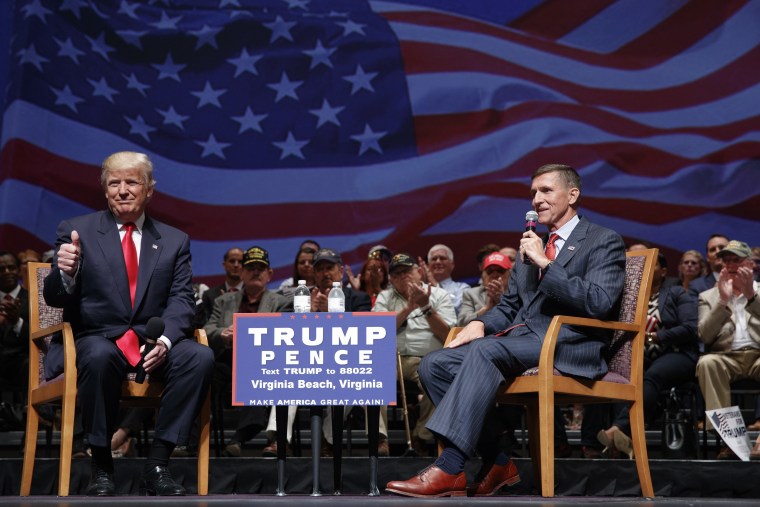A conversation between President-elect Donald Trump's national security adviser and the Kremlin’s ambassador to the U.S. that took place the day President Obama announced sanctions on Russia was not cleared by the White House, administration officials told NBC News.
Trump aide Sean Spicer confirmed Friday that Ret. Lt. Gen. Mike Flynn spoke to Ambassador Sergei Kislyak on the telephone, and said the intent was to set up a call between Russian President Vladimir Putin and Trump once he becomes president.
The contact began, Spicer said, on Christmas Day, with Flynn and Kislyak exchanging holiday greetings via text message.
On December 28 — the day before the sanctions announcement — Kislyak sent Flynn a text message asking if they could speak by phone, Spicer said, and Flynn accepted. The call occurred the next day, Spicer said. He denied that it had anything to do with the sanctions.
Spicer said there was nothing unusual about the call, but White House officials told NBC News it was not coordinated with them. It is unclear how the U.S. government became aware of the call, which was first reported by Washington Post columnist David Ignatius, who said there were multiple calls and raised the question of whether the conversations violated the "spirit" of a law that bars private citizens from negotiating with foreign governments.
Ignatius reported that Flynn phoned Russian Ambassador Kislyak several times on Dec. 29, the day the Obama administration announced the expulsion of 35 Russian intelligence operatives and other punitive measures. The AP and Reuters also reported that calls took place on that day. NBC News has not confirmed that information.
A senior intelligence official told NBC News that the U.S. government is aware of other calls between Flynn and other foreign ambassadors, but that he didn't consider those calls to be improper.
It would not be unusual for the communications of the Russian ambassador to be under surveillance, particularly as the FBI was investigating Russian hacking and other interference in the election campaign, several current and former U.S. officials told NBC News.
White House spokesman John Earnest said the contacts were not necessarily problematic.
"You can imagine why these kinds of interactions may have taken place, why the incoming national security adviser may have the need to contact the representative of a foreign government based here in Washington D.C.," Earnest told reporters Friday. "It depends on what they discussed…in terms of whether or not we would have significant objections about those conversations."
In his column, however, Ignatius invoked the Logan Act. "What did Flynn say, and did it undercut the U.S. sanctions?" wrote Ignatius in his column. "The Logan Act (though never enforced) bars U.S. citizens from correspondence intending to influence a foreign government about 'disputes' with the United States. Was its spirit violated?"

